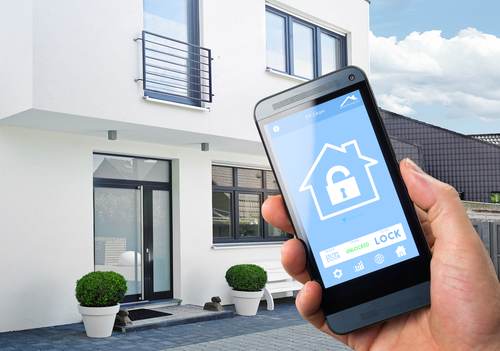Investigating Home Security Systems
 It’s vital for you and your family to feel protected at your home. More than two million burglaries are committed in the United States each year. Taking a chance on your peace of mind is not worth it. Home security systems add a layer of protection for your loved ones and belongings.
It’s vital for you and your family to feel protected at your home. More than two million burglaries are committed in the United States each year. Taking a chance on your peace of mind is not worth it. Home security systems add a layer of protection for your loved ones and belongings.
What’s the best security system for you? Learn the benefits and disadvantages of the different systems on the market. This information includes which installation would be best for you and your budget.
Local Alarm Systems
This is the most basic type of alarm system. It uses simple, unmonitored sensors placed on doors and windows, some of which. on detectors. The battery-powered sensors are similar to those in the wired and wireless systems, but they’re not connected to a control panel. When the circuit is broken–e.g., it is opened—it may include motion alarm sounds directly from the sensor.
The advantage of local alarms is the cost. Sets of alarm sensors can be found in stores or online for under $100. Easy installation means anyone can put them up–usually, it’s a matter of sticking them in the right place.
On the downside, they only make a loud noise. No authorities will be alerted, and if you’re not home, you won’t know it’s been triggered until you get back. Since they don’t add much to your home’s security level, these alarms serve as a temporary solution.
Wired Alarm Systems
This standard home security system connects all parts to an alarm panel through wiring in the home’s walls. Components usually include wired sensors, motion detectors, and security cameras.
These systems normally are monitored through a subscription service and connected to emergency services. When someone trips the system, the alarm sounds; when a sensor door or window opens, a small beep sounds.
Wired systems are a little more complicated than local alarms, so they will require professional installation. On the flip side, they boast more security because someone will be alerted when triggered, and emergency services can be sent to the home even if you’re not around.
But, because they’re wired, the installer will need to drill holes in your wall to power the system. And, if you eventually plan to move out of the home, the system won’t move with you because of the wires. They often require a monthly subscription service, you’ll pay a fee to use it.
Wireless Home Security Systems
Wireless systems function similarly to wired systems, without wires, of course. All communication between the devices is through a wireless signal. It can be integrated with video doorbells, sensors, and cameras.
If the system is monitored, you and the authorities will be notified when the alarm sounds. You can also remotely check on the property by adding cameras to the system.
While more expensive than wired home systems, wireless systems are easy to install and take with you when you move. The installation can be done by a professional or you can tackle it yourself. Plus, they have multiple add-on options, such as carbon monoxide detectors, fire alarms, doorbell cameras, and an app.
Most require you to buy individual components, which can be higher-priced. The batteries must also be changed manually every couple of years. Should your network go down in a power outage, the wireless security system may also not work.
Monitored Systems
As we’ve already mentioned, some security systems are monitored. This means your home is connected to a person at the security company’s call center for added security. When the alarm is triggered, a person will call you and the appropriate authorities. All you, the homeowner, have to do is engage the alarm panel when you leave the home or go to bed.
Unmonitored Systems
These systems, whether wired or wireless, are not connected to a call center. Instead, a loudsounded when a sensor is tripped to scare away intruders. The monitoring is up to you. You may get a siren/alarm alert via an app if the device comes with one. Because it doesn’t use call centers and people, unmonitored systems are your most cost-effective security option.
Questions to Consider
When deciding on the best system for you, your home, and your budget, ask yourself:
Do you want to install the system on your own to save money?
Or, do you want a professional to handle the installation and ensure things are done correctly?
What features are available with the system, i.e., fire and carbon monoxide detectors, glass break sensors, panic buttons, additional motion detectors, doorbell cameras, and 24-hour video monitoring?
Which Security System is Best for You?
Every home is different, and all owners have different accepted levels of risk. But here are some universal suggestions:
- If you own your own home or if you are renting, a wireless security system is the easiest option unless the home is already wired for a system by the previous homeowners.
- For larger homes and larger budgets, a wired, monitored system may be preferable to cover the area.
- Do you plan to move in the near future? If you will only live on the property for a couple of years, it makes more sense to use a wireless system you can take with you.
Home security products are continuously innovating to maximize the protection they provide homeowners. No matter which route you go, you’ll have many companies and products to explore that will add additional protection to your home.
Updated April 2024
Start Your Home Search
Preston Guyton
Share this Post
Related Articles
Real Estate Tips
How to Communicate Your Value As A Real Estate Agent
Real Estate Tips
10 Essential Steps to Hiring a Contractor
Real Estate Tips
Why Perfection Squashes Your Real Estate Businesses
Real Estate Tips





